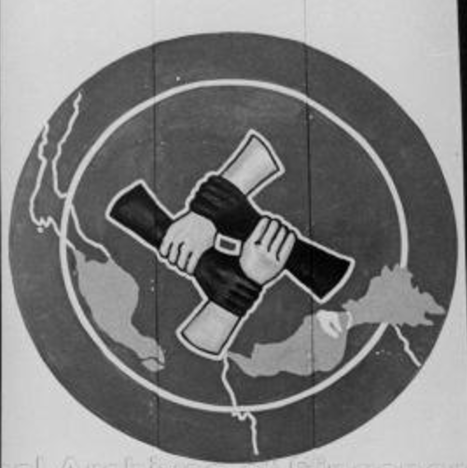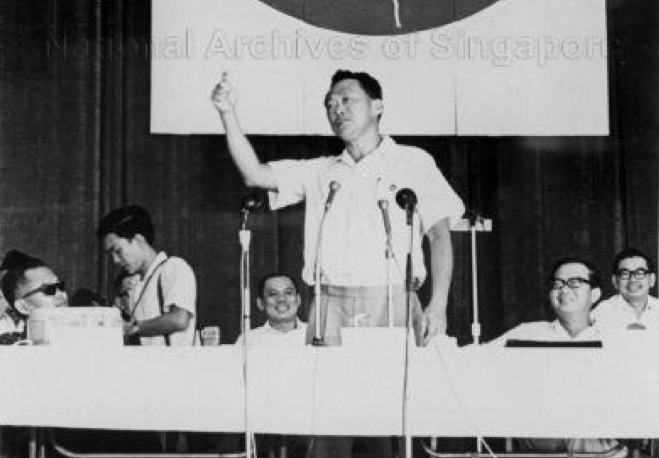Come August 9, Singapore will be marking 52 years of independence after its separation from Malaysia in 1965.
Amidst all the national celebratory fervour, it is perhaps hard to imagine that our road to independence is actually born from a concept that is related to Malaysia - a "Malaysian Malaysia".
What is this concept of a "Malaysian Malaysia"?
A "Malaysian Malaysian" was the idea of equality for all Malaysian citizens regardless of race. It is the antithesis of a "Malay Malaysia", where the Malay community is favoured over all other citizens.
A "Malay Malaysia" still applies across the Causeway today.
So how is Singapore's independence linked to a "Malaysian Malaysia"?
Singapore was part of the Federation of Malaysia from September 16, 1963 to August 9, 1965.
During its days in Malaysia, Singapore's government, led by its founding generation of leaders, disagreed with the Malaysian government's affirmative action in granting special rights and privileges towards the Malay community.
So, they started a movement to campaign for a "Malaysian Malaysia", where all races are equal, as opposed to the Malaysian government's favouring of a "Malay Malaysia".
[caption id="" align="aligncenter" width="768"] Prime Minister Lee Kuan Yew reading the Malaysia proclamation during Malaysia Day celebrations at City Hall on Sep. 16, 1963. Source: NAS[/caption]
Prime Minister Lee Kuan Yew reading the Malaysia proclamation during Malaysia Day celebrations at City Hall on Sep. 16, 1963. Source: NAS[/caption]
How did Singapore's founding leaders campaign for a "Malaysian Malaysia"?
Singapore's founding leaders, who included Lee Kuan Yew, Goh Keng Swee, Toh Chin Chye, S Rajaratnam, and Othman Wok, formed the Malaysian Solidarity Convention (MSC) with four Malaysian opposition parties, on May 9, 1965.
[caption id="" align="aligncenter" width="768"] Formation of the Malaysian Solidarity Convention at Sri Temasek on the Istana's grounds on May 9, 1965. Source: NAS[/caption]
Formation of the Malaysian Solidarity Convention at Sri Temasek on the Istana's grounds on May 9, 1965. Source: NAS[/caption]
The MSC's goal was to champion the concept of a "Malaysian Malaysia", which was at loggerheads with the Malaysian government.
 Malaysian Solidarity Convention's logo. Source: NAS
Malaysian Solidarity Convention's logo. Source: NAS
Naturally, the Malaysian government, led by the United Malays National Organisation (UMNO), was not cool with this move by Singapore.
But Singapore's founding leaders pressed on with their belief in multiracialism.
In a Malaysian parliament sitting on May 27, 1965, founding prime minister Lee Kuan Yew made a speech that called for the Malaysian government to treat all races equally under the "Malaysian Malaysia" concept.
He referenced the fundamental rights and liberties of all Malaysian citizens laid out in the Federation's constitution, defended the formation of the MSC against the Malaysian government's criticisms, and said:
"Every act carries a penalty and the penalty of not playing in accordance to the rules so far as Malaysia is concerned - and its not Malaya now this is Malaysia -- is disintegration. And I will be honest with the Minister opposite and his colleagues; either a Malaysian Malaysia or nothing - we are satisfied. We cannot agree to anything but a Malaysian Malaysia. We are prepared to play in accordance with the rules too: wait 5 years, 10 years, 15 years, but the ideas we represent must come true."
[caption id="" align="aligncenter" width="768"] MSC held a meeting at Kuala Lumpur's Parliament House on the eve of the Malaysian Parliament sitting on May 27, 1965. Source: NAS[/caption]
MSC held a meeting at Kuala Lumpur's Parliament House on the eve of the Malaysian Parliament sitting on May 27, 1965. Source: NAS[/caption]
Things did not stop there.
Days later on June 6, 1965, the MSC held a rally at Singapore's old National Theatre (it's been demolished), where Lee, along with the other founding leaders, continued to call for a "Malaysian Malaysia".
[caption id="" align="aligncenter" width="768"] Malaysian Solidarity Convention rally at the old National Theatre. Source: NAS[/caption]
Malaysian Solidarity Convention rally at the old National Theatre. Source: NAS[/caption]
[related_story]
In his opening speech, Lee said:
"Friends and fellow-Malaysians, this is quite an eventful day, for this is the beginning of a new tide in the affairs of the people of Malaysia. It took a long time for us all to come to the same conclusions despite our differing experience in Malaya, Singapore, Sabah and Sarawak. Our friends in Sabah are not here today officially, but I can assure you that we have many friends there. There is no doubt about it that it took us a long time to reach inevitable conclusion that these people were up to no good. You know the line they were taking with growing truculence on a heavy racial accent, the intimidatory postures and the snarling guttural notes on which they sent out their signals to their followers on the basis of race lead us to only one conclusion -- that if this goes on, Malaysia will not belong to Malaysians. And since there are so many Malaysians, we decided that the time has come for us to speak our minds. The technique is quite a subtle one. They speak in two different wave-lengths -- one length for multi-lingual, multi-racial consumption, the other, a special VHF meant for their followers. The good men, multi-racial men, the top leaders, from time to time, completely dissociate themselves from this special VHF, but the wild men keep up the pressure."
[caption id="" align="aligncenter" width="430"] Lee Kuan Yew speaking at the Malaysian Solidarity Convention rally at the old National Theatre in 1965. Source: NAS[/caption]
Lee Kuan Yew speaking at the Malaysian Solidarity Convention rally at the old National Theatre in 1965. Source: NAS[/caption]
He also pointed out that the campaign would be a long drawn one:
"We are in no hurry. We don't want to knock them down tomorrow, or day after tomorrow. All we want is to get towards a Malaysian Malaysia. We can go slowly. Make haste slowly, and will win. And this will be a nation that will survive for hundreds of years as a separate identity in Southeast Asia, a multi-racial community -- a confluence of four of Asia's major cultures and civilisations, superimposed with a streak of British civilisation."
He ended his initial speech at the rally with this call:
"So, you see, our confidence is solidly based on demography, which means the distribution of the various groups and communities in Malaysia; on geography, which means the territories, the terrain, the sea in between; and on history, which means man must progress and break through the old tribal society into the modern age, because the world has got smaller, ideas take less time to be transmitted, and because man wants to advance. And Malaysians want to keep up with the rest of humanity, with the rest of the world, and advance as Malaysians. And that is the slogan I give you. That is the slogan we have decided. We'll win, a Malaysian Malaysia."
In his concluding speech at the rally, Lee was probably mindful of the possibility of Singapore or any of the other territories, such as Sabah or Sarawak, getting thrown out of the Federation of Malaysia, but he also pointed out the need to push for change without getting intimidated:
"We cannot afford to be intimidated. We will organise like-minded peoples throughout Malaysia. We have not the slightest intention of breaking Malaysia up regardless of what they allege we have said. We have not the slightest intention of seceding and obliging their "ultras" and leaving our friends, our fellow countrymen, our fellow Malaysians to the tender mercies of the "ultras". They want us out, you know."
[caption id="" align="aligncenter" width="768"] Lee Kuan Yew meeting fellow members of the Malaysian Solidarity Convention. Source: NAS[/caption]
Lee Kuan Yew meeting fellow members of the Malaysian Solidarity Convention. Source: NAS[/caption]
Indeed, while Singapore's founding leaders also tried to fight against getting separated from Malaysia, the possibility of it was vaguely in the back of their minds, as Rajaratnam was quoted in Men in White saying in an oral history interview:
"Question: At the time when PAP undertook the MSC, were there already suspicions that this would lead to Singapore's expulsion?
Rajaratnam: Well, vaguely we thought that we'd get into trouble. I don't know to what extent. Whether there'll be mass arrests, banning of party. In fact, we didn't think that separation would have been the alternative. We thought it'll be some kind of crippling of the PAP."
Essentially, the formation of MSC actually marked the turning point in history that sent Singapore down the road to independence on August 9, 1965 - three months after the MSC was formed on May 9.
The push for a "Malaysian Malaysia" by Singapore's founding leaders riled the Malaysian government to the point where then Malaysian prime minister Tunku Abdul Rahman decided that enough was enough.
[related_story]
"Hive off" Singapore from Malaysia
Although some documents from the "albatross file" on display at the National Museum today reveal that negotiations between Singapore and Malaysia over separation might have taken place much earlier than we once thought, the dominant narrative has often been that Tunku Abdul Rahman decided to "hive off" Singapore from Malaysia.
In his famous words spoken at a press conference after Separation Act was passed in the Malaysian parliament:
"It was my idea that Singapore should leave the federation and be independent. The differences between the state government of Singapore and the central government of Malaysia had become so acrimonious that I decided that it was best that Singapore went its own way. Otherwise there was no hope for peace."
And so that's how the concept of "Malaysian Malaysia" led to an independent, multiracial Singapore.
Top image from NAS.
1819 is a labour of love by Mothership.sg where we tell stories from Singapore’s history, heritage & culture. Follow us on Facebook, Instagram and Twitter!
If you like what you read, follow us on Facebook, Instagram, Twitter and Telegram to get the latest updates.
